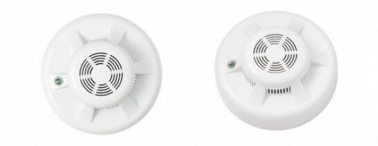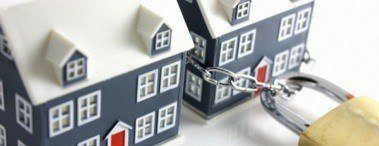
A fire alarm or smoke detector is something that many people may take for granted, especially if they are not homeowners and live in an apartment or rental home.
The early warning of fire or smoke afforded by a home fire alarm can literally mean the difference between life and death. Most fire-related fatalities occur when people are asleep and fail to spring into action in time to escape smoke inhalation; the primary cause of death in a fire.
The Difference Between a Smoke Alarm and a Fire Alarm System
While a fire alarm or smoke detection system provides the crucial early warning to escape injury or death in a fire, there is a significant difference between the two systems.
A smoke alarm or detection system may consist of 1 or more units mounted on the ceiling, as either stand-alone units or networked together in a system.
Units are triggered when smoke and heat are present in proximity to the device. Temperature sensitive models react to heat; those with photoelectric sensors react to smoke particles in the air. Smoke detectors that use an ionization sensor rely upon chemical reaction, to detect smoke caused by flaming fires. They are the most common and are relatively inexpensive.
When a stand-alone unit is triggered, a fire alarm sound goes off. When one unit of a system is triggered the whole system responds with an audio alarm, which may include a visual alarm as well. Affordable, stand-alone single units can be purchased for under $20.00 and are battery operated. A network of detectors can be either 120V house current powered or battery powered; most units running on house current also have battery back-up in the event of power outage. Batteries for any type unit should be checked at least once monthly, and replaced when necessary.
A fire alarm system consists of:
- Detection devices - heat sensors, photoelectric sensors (for smoke) and ionization sensors (for chemical reaction).
- Alarms - including audio and visual features; such as buzzers, a fire alarm bell, or a fire alarm strobe.
- A fire alarm control panel - the main control unit of a system; connected to a central monitoring station at a home security company or local fire department.
- Manual signal boxes - the common “break glass, and pull switch†type boxes which are manually operated to signal a possible fire emergency.
- An emergency battery system - which kicks on in the event of power outage.
- A wireless push button fire alarm or distress alarm - such as those worn on a necklace or wristband by elderly or disabled people.
- Fire suppression components - such as a fire sprinkler system; engaged in the actual event of a fire.
Stringent Government Regulations
Under the 2005 National Fire Code of Canada (NFC) guidelines, a residential fire alarm or smoke detection system may be optional for most private residences. However, a commercial fire alarm system is required in public buildings, commercial buildings, apartments, nursing homes, assisted living homes and government buildings. This type fire alarm installation must meet stringent NFC regulations, based upon the International Fire Code.
A commercial fire alarm system must be installed by a licensed electrician or apprentice; systems must pass a regular fire alarm inspection. Audio devices must meet minimum decibel levels when operating. When in back-up battery mode, there are minimum voltage requirements; both at the fire alarm panel, and at the fire alarm strobe or audio alarm located at the end of the circuit. This is to insure that audio and visual devices will operate at the minimum required level, even when the fire alarm battery system has been running for a number of hours.
Once the system has passed inspection, a renewed fire alarm certification is issued until the date of the next inspection. A good regular fire alarm maintenance program includes frequent fire alarm testing of both system components and battery back-up to insure everything is in good working order.
Many homeowners opt for a complete home security system which includes 24/7 fire alarm monitoring by a fire alarm service or fire alarm company. Expect to pay $1000 to $2500 for the equipment, depending on how elaborate the selected system is. On-going monthly subscription fees for this type service are typically priced from $20 to $35 per month.
Hire a Qualified Professional
While a stand-alone smoke detector fire alarm can be easily installed as a DIY project, a home or commercial fire alarm system requires the certified services of an electrician or fire alarm technician for installation and maintenance.
To locate reliable fire alarm installers or a fire alarm service provider anywhere in Canada, homeowners are turning to TrustedPros.ca, where the task is fast, easy, and free.
Homeowners or business owners can sign up without any cost or obligation whatsoever. And then post their Canada home security system project online at TrustedPros.ca, where it is immediately visible to reliable service providers in their locality. Member contractors also receive e-mail notification of new project postings within their field of expertise, and vie for the job. Providing competitive bids in days, even just hours after project posting.
Project owners can view helpful information about each potential contractor online; including company profile pages, references, customer comments and feedback, licensing/insurance/certification credentials, and photos of company staff and recently completed projects. And then make an informed hiring decision, or hire no one at all. Remember, there is no obligation whatsoever.
Posted by: TrustedPros





